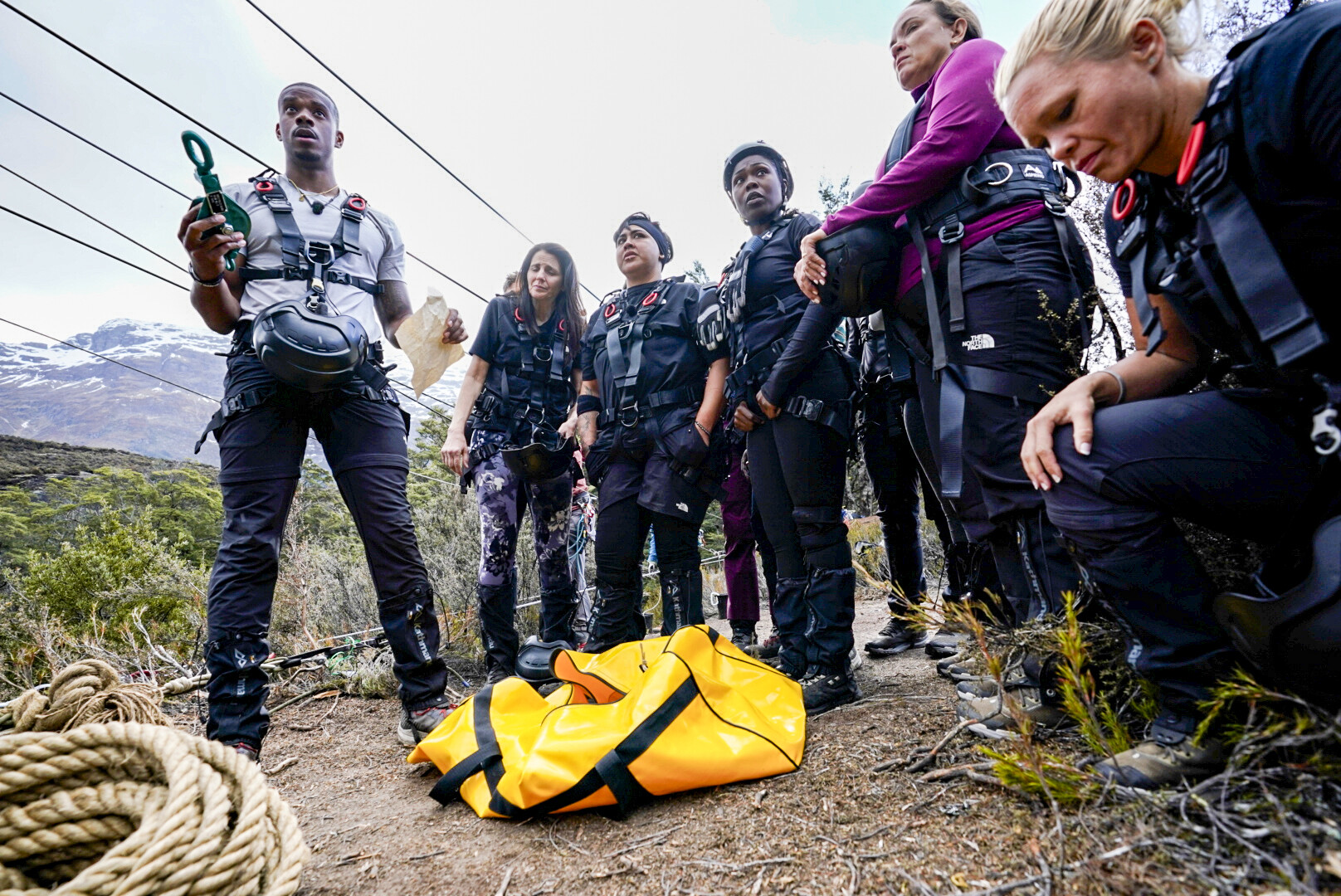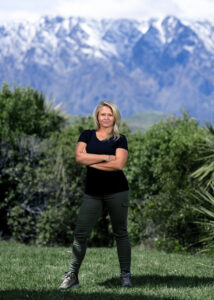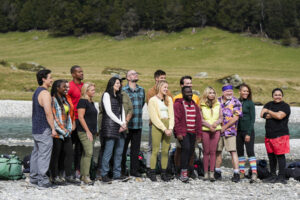From Cockpit to Camera

The Trailblazing Journey of Rose Mattie
Writer Shannon Severson // Photography by Sean Beale/CBS
With nearly 250 years in existence, there are not a lot of firsts left to be had in the vaunted U.S. Army, but Arizona National Guard Chief Warrant Officer 3 Rose Mattie (Ret.) played a key role as one of the first women to train for and serve in combat for the U.S. military. Her daring nature also landed her a role on CBS’ new strategic high-altitude competition show, “The Summit,” airing Wednesday nights following “Survivor.”
As the granddaughter of three World War II veterans, Minnesota-born Mattie was aware of her family’s military legacy, but she didn’t know many details when she decided to join the Army after her first year of college, hoping to help finance her education. She probably couldn’t have anticipated that she would ultimately become a Black Hawk helicopter pilot, soaring through the skies and breaking barriers along the way.
Mattie spent her first nine years as an MOS 62B engineer equipment mechanic and then a chemical, biological, radiological, nuclear specialist, deploying to Iraq for the first time from 2003-05 and then again from 2009-10. Then, her military career took a dramatic turn that would lead her to the forefront of military history.
Breaking Barriers



“In 2010, the Special Operations Command realized that there was a need for trained female soldiers to help with the cultural differences in the Middle East,” Mattie says. “The U.S. military had a law that females were not allowed in combat roles. That meant there were no females in the Special Operations community because they were all combat roles.”
Mattie says a call went out seeking female soldiers who would work with the Army’s elite Special Forces. She attended the first-ever all-female assessment. Hundreds applied, but only about 60 passed muster to train at the John F. Kennedy Special Warfare Center and School at Fort Liberty, North Carolina. The rigorous selection process was just the beginning of an intense journey that would push Mattie to her limits.
“From there, I deployed to a remote kinetic location with my ‘battle sister’ and female interpreter,” Mattie says.
That elite female program had her deployed as a cultural support team member for special operations with the Green Berets within an Operational Detachment Alpha team in an Afghan village. During this time, she also served in support of the Navy SEALs from 2011-12. This program was so successful that it became the model for the military’s support for women serving in combat, as they do today.
It was against this backdrop that Mattie decided on a new challenge: becoming a Black Hawk helicopter pilot, defying naysayers and gravity itself.
“You never know what you can do unless you try,” she says, her determination palpable. “I’d rather try and fail than not try at all. So many people told me I couldn’t do it, so I did.”
Before she could fly, she had ground school courses that included Survival, Evasion, Resistance and Escape (SERE) training, a program developed after World War II to train military personnel whose occupations carry a high risk of capture by enemy forces. It is reputed to push the toughest of soldiers to the absolute brink of what one can endure.
“I cannot talk about what we learned or did in that course,” Mattie explains, “but I will say I earned the respect of some of the Vietnam veteran cadre who doubted that I should be there.”
Mattie reveals that she was the only woman in a group of 100 men for Warrant Officer Training and, in her flight company, one of at most two women at any given time. She was definitely underestimated and treated differently as she defied stereotypes and hundreds of years of military tradition, but she didn’t let that stop her.
“I overcame it by my actions,” Mattie says. “Actions speak louder than words. I made sure that I achieved one of the top fitness scores and made sure I flew with the toughest flight instructors.”
Over the course of her service, she married a fellow soldier and became a mom to two children — which caused her to be grounded during certain stages of pregnancy, during which time she completed an Aviation Life Support and Equipment course.
“I wanted to make sure that I could still contribute to the team,” Mattie says, her commitment evident. “I had to fight to get approval to go. We learned how to inspect and repair equipment such as life jackets, helmets and other survival gear that can be packed in the helicopter.”
Beyond the Battlefield



Mattie retired from the military in 2019, partly due to her husband’s military career that took the family to Colorado; Hawaii; Chandler, Arizona; and now Germany. Her transition to civilian life brought new challenges and opportunities, but her spirit of service remains undiminished.
She reveals that being a mom and a military spouse turns out to be tougher than flying a helicopter, a statement that speaks volumes about the often-overlooked sacrifices of military families.
“I flew until [my children] were 3 and 1 because I was determined to do it all,” she recalls. “I had to change my mindset to be a pillar of stability for our children, setting the foundation of safety and love during their [early] years.
“It was definitely a hard decision at first because our culture does not see the value in the role of mothers and people made me feel like I was giving up on my career and losing out on a life of adventure. But now I take my children [along] on my adventures! They have traveled the world with me, they camp and rock climb and I will be teaching them scuba diving soon. They are also resilient and are growing into amazing humans.”
Mattie says her children don’t see gender stereotypes, and when they see a helicopter, they exclaim, “My mom can fly that!” It’s a testament to the impact of her trailblazing career on the next generation.
The adventurous young souls she is raising are the reason behind her appearance on “The Summit,” in which a group of 16 strangers tackle a treacherous journey in the New Zealand Alps to reach a mountain peak for a share of $1 million. Along the way, they must face physical and mental challenges, attempting to avoid being voted out or dropping out.
“I had done some background work in Hawaii, and the kids thought it was fun to see me on TV,” she recounts. “So we didn’t know what this casting call was for, but the kids helped me make a video, and I [was] cast.”
When she boarded a helicopter for the show, it was a special thrill, and Mattie says she was practically ready to take the controls and fly herself to the top of the mountain. As for her new career on the small screen, she says she’s up for adventure and any opportunity that comes her way. In fact, there’s something familiar about this new world.
“There are a lot of similarities between the entertainment industry and the military, especially behind the scenes,” she says. “My resume is built for that.”
Mattie’s bravery and years of service to country have earned her accolades with family and with veteran organizations, including being named a Storyteller Award Honoree with Imprints of Honor. Mattie appeared in the 2017 fifth edition of the organization’s publication, “Since You Asked.” She has used her story to inspire others with the lessons she’s learned.
“My service has taught me that you cannot always control what happens to you in life, but you can control how you react,” she says, her words carrying the weight of hard-earned wisdom.
Mattie’s journey from the cockpit of a Black Hawk to the peaks of New Zealand and beyond is a testament to the resilience, adaptability and continued service of our veterans. Her story reminds us that the spirit of service extends far beyond the battlefield, enriching our communities and inspiring future generations.

